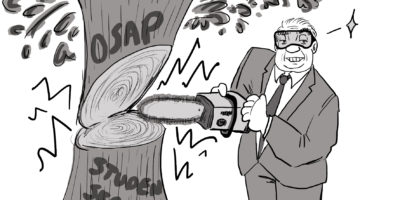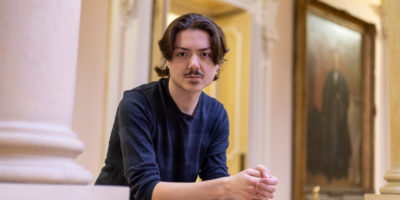By Phillipe Devos
When Ryerson became a university in 1993, about 30 per cent of the faculty had PhDs — the lowest of any university in the country. As a polytechnic university that emphasizes practical rather than academic approach to education, the low percentage was to be expected and even boasted about. Ryerson profs weren’t academics, they were experienced practitioners who taught up-to-date skills to the leaders of tomorrow.
That’s not as true today as Ryerson pushed to hire professors with “terminal degrees” — the highest possible in each field — have been hired, which means new Ryerson profs must have at least a master’s degree.
In 1992, Ryerson was caught trying to improve the academic accreditation of profs by sending them to overseas universities for quickie degrees that didn’t stand up to Canadian academic standards. Now, the increasing academic standing of faculty is being achieved legitimately through hiring. More than 100 new profs were hired for this academic year. All had at least a master’s degree or will have to get one to keep their tenure.
The Maclean’s university rankings, released last Monday, showed 54.1 per cent of current faculty members at Ryerson had PhDs, up from the previous year’s 49.5 per cent. That 8.2 per cent jump is the greatest leap made by any university in the country during the past year. Although not included in the Maclean’s rankings, there are more profs with master’s degrees at Ryerson than ever before, which means students in applied arts programs are going to suffer.
In science programs such as engineering, chemistry, geography and architecture, as well as arts departments such as history, sociology, English and psychology, the best educated profs money can buy should be hired. But in applied arts programs such as fashion, graphic communications management, image arts, interior design, journalism, radio and television arts and theatre students are best taught by experienced practitioners with one foot firmly rooted in the field they’re teaching. The best applied arts profs aren’t those who left their professions years ago to return to academia for a master’s or PhD. They’re working professionals with their finger on the pulse of the current realities in their field.
The pest performers, designers, artists, journalists and broadcasters in the country don’t need graduate degrees and neither do the best educators in applied arts.
Not one of my best profs who taught me had graduate degrees. David Hayes is a top magazine writer and he’s been doing an excellent job in teaching me and other journalism students at Ryerson for several years as a part-time instructor. This year he’s been made a tenured professor, and rightly so. But now he has to take time away from teaching journalism students to study for a master’s degree that isn’t likely to improve his ability to educate students.
Other news profs hired to teach applied arts courses because of their exceptional practical experience will also have to have to leave the front of the classroom at Ryerson to sit and take courses elsewhere so they can teach here, which deprives students of exceptional instructors.
Unfortunately, the polytechnic nature of Ryerson faces further assaults. Dennis Mock, v.p. academic, says he hopes to see more than 70 per cent of Ryerson’s profs with PhDs. Profs who teach Ryerson’s upcoming graduate degree programs must all have PhDs to meet the standards of the Ontario Council of Graduate Studies. Ryerson’s chief development officer Gordon Cressy wants to drop the word “polytechnic” and “applied” from the vocabulary.
Before too long, the tradition of a polytechnic education will die as Ryerson climbs up the Maclean’s ratings but falters at providing students a truly applied education.












Leave a Reply